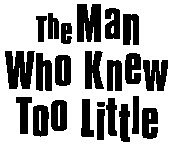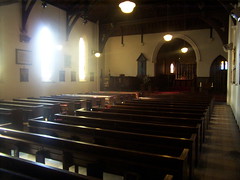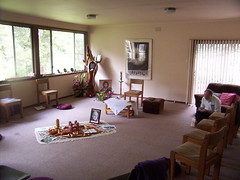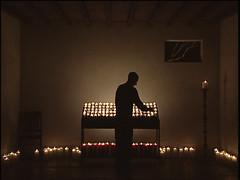One of the great things about St. Peter’s hosting the chaplaincy to RMIT happened last Monday morning when 40 students enrolled in a course on Globalization and Religion came to St. Peter's to hear about Anglicanism. We all sat in the church for almost three hours and had a wild conversation about everything: architectural and migration, meaning and myth, religion and spirituality, politics and scripture. They had some wonderful questions, made some great comments, and I only hope it was as good for them as it was for us: but I think it was, I think we all learned something.
So there’s a lot of good learning going on at St. Peter's: several series of Bible Studies on Thursday nights and Sunday afternoons, as well as the monthly meetings of the Canterbury Readers, who discuss essays by Rowan Williams. Good learning, good work. Looking deeply into these texts can sometimes be difficult, but it is worth the struggle, because when you really wrestle with the words, you find them pointing to a reality that is more than just words, more vibrant, something that pushes back; like human flesh, like God meeting human flesh.
So it is worth it: to study scripture, to work through theology, to meet in a church and talk together about what matters in the end. It is important to make room for raw questions and concerns to be heard and shared: the heart of God has room for that.
Our Anglican tradition makes room too, with a model for learning and discernment that uses the image of a four-legged stool - with one leg each in scripture, tradition, reason and experience. It’s a way we keep our faith spacious, balanced and honest.
First, we are people of the Scripture, and our daily lives need to be seen and understood in the history, poetry, genealogy, prophesy, revelation we see in the Hebrew Scripture, which we call the Old Testament, as well as in the Christian Gospels, Acts, Epistles and Revelation that we know as the New Testament. That is foundational.
We are also a people who have gathered, prayed, considered, and reflected in the light of those books for the last two thousand years. So there is an immense body of work, more writings, poetics, prophesy and politics, that need be considered: the work of the community gathered prayerfully throughout history, a deep and profound tradition that resounds and responds to the mighty acts of God over time, to the present day. So, Scripture and Tradition.
Then, we are a people who believe as well that the Spirit of God never ceases working in the whole world. In that light we use our reason to evaluate all good thoughts and actions, from all peoples and places and cultures, through education, the social and natural sciences, all technology, art and media, as ground for inspiration, redemption, recreation. We are not afraid to use our God-given reason.
And, finally, in light of the incarnation of God in Christ; we honour our very own lives, our corporate and personal experience. Here we take the chance that each and every one of us here, and everywhere, is a word of God, a gift of God: a place where God’s creativity, redeeming love, intimate conspiracy can come to new birth and speak in a new way. So Scripture, Tradition, Reason, Experience: The four components in this Anglican way.
The Gospel for this morning has four parts as well. Remember, what we just heard comes right after Simon-Peter’s confession of faith, right after that great moment when Peter had identified Jesus as God’s anointed one, the saviour, and Jesus had called him Petros, the Rock. So now we have the unfolding of another level of who the saviour is and how that saving life lives out in history. So, Jesus “began to show his disciples that he must go to Jerusalem and undergo great suffering at the hands of the elders and chief priests and scribes, and be killed, and on the third day be raised.”
Poor St. Peter! Think what it must have been for him, just after he is called the Rock, after all that clarity, that light and glory, after he got it right! To start to look ahead at the dark and dirty death of all this love, all he had staked his life upon. You can see why he speaks up, as Peter so often does, “Wait! Now that we know what is right, what is good; it can’t go this wrong, this bad!” Everything in him rails against this new road.
But Jesus rebukes him: “You are a stumbling block to me; for you are setting your mind not on divine things but on human things…[For]If any want to become my followers, let them deny themselves and take up their cross and follow me. For those who want to save their life will lose it, and those who lose their life for my sake will find it…For the Son of Man is to come with his angels in the glory of his Father, and then he will repay everyone for what has been done.”
So, four more things to deal with; four very big things: life, death, resurrection and return. Poor Peter, poor us! How can we live with life writ this large, life asking this much? How do we follow the way of Jesus into these depths? How do we take this in and live this out? How can you get there from here?
Here’s a story. This last Friday I had lunch with two friends, and we were talking about what brings people to St. Peter’s. I said I thought in the end it is vocation, responding to an individual call that come in each of their lives, a call that bids come live life within the Christian story, and maybe that is where we go from here,
For each one of us here has had a moment, and maybe more than one, where God opens our eyes to glory, care, compassion; to the fragile beauty of what it means to be on this tenuous human journey together. Maybe that’s what some mean by being born again, for I think that is when our individual participation in Christmas comes: when Jesus – God’s word and work of love and acceptance and hope - is born in our lives. And that reality grows up and moves out into our world, begins to enlightens us and lighten up the world we live in, just like the Epiphany, where people come ‘round, see the difference, note the newness and the change.
But, for a lot of us, most of us, almost everyone, it often doesn’t last that long. Real life has a way of turning things around. The road gets narrow, the shadows of sin, accumulations of shortcuts and easy ways, our own and others, throw us into a desert of questions and conundrums where we walk the way of faith more slowly. It is the arid land of Lent, We’ve all been there, we know the story of the times that can take us where we might seem to lose the way; where we might feel lost. And here the man on the cross is a silent and eloquent picture for each of us, a picture of each of us in the place where hope falls silent and where we lose our lives, where all we know of faith falls dead.
But by grace a glory can come here, because the reality of the life and love of God rises up above all false accommodations, all less than adequate ways of seeing how big life is, for God’s life even has room for death. By grace we wake up to Easter! When our faith opens by grace to a new world, where there is a hope that is bigger than we know; and this hope often takes us to an understanding of - not only how big God is - but how intimate, how close God can come. Where we can arrive at a place where the whole creation seems to be speaking out in every language, in all deeds and words ands ways, even in a fertile silence, nothing less than the mighty acts of God. We come to a kind of Pentecost where the deep intimacy of the Holy Spirit enlivens our lives and reforms our relations and our understandings. It may not always last, it usually doesn’t. But you will remember.
Christmas, Good Friday, Easter, Pentecost! Life, Death, Resurrection, Return! We come here every Sunday with all the contradictions that come in living life on life’s terms, showing up and trying to be whole and human and holy, and Sunday after Sunday we stand in the middle of our lives, in the middle of this place, and say, Christ has died, Christ is Risen, Christ will come again! Life, death, resurrection, return!
12 years ago, when I was the chaplain at San Francisco State University, a really narrow, terribly unpleasant Christian pastor looked at me and asked, “Have you been born again?” And I said, "On a good day, at least four times!" The way God we follow is both that big and that intimate. As Thomas Merton puts it, we are called "to be repeatedly born in the spirit, in light, in knowledge, in unknowing, in faith, in awareness, in gratitude, in poverty, in presence, and in praise." Moving every instant: into a continuing and deeper participation in God’s creativity, God’s pilgrimage in flesh and history, God’s loving and continuing intercourse in the intimacy of the spirit. It is a wide way, a deep way, a wonderful way, a way that will grow you up and bring you home. So we come here to learn what it means to be alive, dying and rising in a world where Christ has died, Christ is risen, and Christ will come again. We come here to learn who we are.




